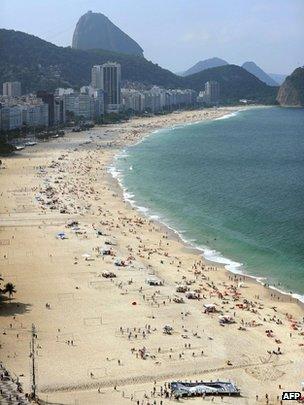Rio+20: Expert panel's call to 'seize moment'
- Published

The declaration is being presented to delegations at the summit in Rio
Governments must seize the "historic opportunity" of the Rio+20 summit to put the world on a new sustainable course, says a panel of Nobel laureates, ministers and scientists.
Society is "on the edge of a threshold of a future with unprecedented environmental risks", they conclude.
Their declaration is being presented to government delegations here.
In the negotiations, Brazil's plan to sign off a new package by Monday night failed, with rows on several issues.
The Rio+20 meeting comes 20 years after the Earth Summit, and was called with the aim of putting humanity on a more sustainable pathway, alleviating poverty while preserving the environment.
The panel's declaration made clear that as far as they were concerned, the challenge is immediate and significant.
"The combined effects of climate change, resource scarcity, loss of biodiversity and ecosystem resilience at a time of increased demand, poses a real threat to humanity's welfare," they write.
"There is an unacceptable risk that human pressures on the planet, should they continue on a business as usual trajectory, will trigger abrupt and irreversible changes with catastrophic outcomes for human societies and life as we know it."
The group of more than 30 signatories includes Nobel laureates such as Carlo Rubbia, Walter Kohn, Douglas Osheroff and Yuan Tseh Lee, as well as politicians including Brazil's Environment minister Izabella Teixeira and Finland's recently ex-President Tarja Halonen.
Gro Harlem Brundtland, the former Norwegian prime minister and World Health Organization chief who led the Brundtland Commission on sustainable development in 1987, was also on the panel.
Prof Will Steffen from the Australian National University, one of the leading scientists in the group, said he hoped the declaration would make the implications of ministers' choices clear to them.
"There are intrinsic limits to the planet's capacity, and we must recognise that we're transgressing them - in fact, have transgressed some of them," he told BBC News.
"Business as usual is not an option."

- What is the Rio summit about?







Tarja Halonen said the declaration could and should encourage leaders to raise their ambitions in Rio.
"What this says to negotiators is they need to push harder, they must be encouraged to do more," she told BBC News.
"The most important thing we are telling them is the urgency."
The host government's delegation chief Luiz Alberto Figueiredo Machado told reporters on Monday afternoon that he was "absolutely convinced" negotiators would finish talks within hours, leaving little for the estimated 130 heads of state and government to do when they arrive on Wednesday.
But according to sources, the discussions - from which reporters are excluded - saw heated exchanges over a number of issues, including the green economy, fossil fuel subsidies and sustainable development goals (SDGs).
EU ministers complained that the hosts had pushed their version of the text through without real negotiation, and that the outcome was far too weak.
In a joint statement, EU Environment Commissioner Janez Potocnik and Danish Environment Minister Ida Auken said the EU "remains committed, for as long as it takes, to achieving concrete and ambitious outcomes from the Rio+20 negotiations.
"We believe that in these final stages, our ministerial colleagues are best placed to reach a political agreement with the substance needed to bring the world towards a sustainable future."
However, if significant problems are left for governments leaders to resolve, the EU's capacity will be compromised by the fact that most European presidents and prime ministers are staying away from Rio, preferring to remain at home to manage eurozone-related fallout from Sunday's Greek election - though some are at the G20 summit in Mexico.
Direct endorsement
Brazilian President Dilma Rousseff is expected to present the "final" Rio+20 agreement to G20 leaders in Mexico on Tuesday, providing it is finished.
That would allow world leaders not going to Rio, including US President Barack Obama, German Chancellor Angela Merkel and UK Prime Minister David Cameron, to give the document their endorsement before the final round begins in Rio.
The fossil fuel subsidy issue was highlighted during the day by environmental campaigners who directed an internet-based assault at delegates to both the Rio and G20 meetings, in the process attempting to set a world record for the most uses of a Twitter hashtag - in this case, #endfossilfuelsubsidies.
G20 leaders pledged three years ago to phase out inefficient fossil fuel subsidies, without setting a timetable or a mechanism.
A report from the research and campaign group Oil Change International, released before the Rio meeting, found that none of the G20 members had moved towards meeting their pledge.
Instead, more are simply not reporting their subsidies to the G20.
Estimates of the extent of subsidies run from about $400bn to about $1 trillion per year. Studies suggest that eliminating them would make a substantial contribution to reducing greenhouse gas emissions and lead to social benefits such as increased employment.
Follow Richard <link> <caption>on Twitter</caption> <url href="http://twitter.com/#!/BBCRBlack" platform="highweb"/> </link>
- Published17 June 2012
- Published16 June 2012
- Published15 June 2012
- Published14 June 2012
- Published13 June 2012
- Published12 June 2012